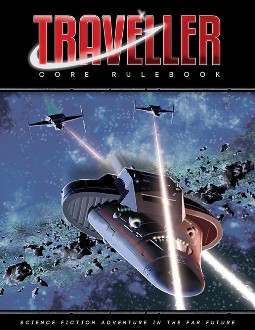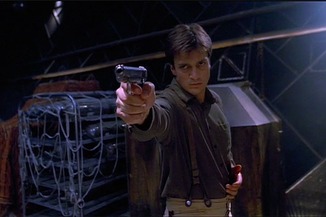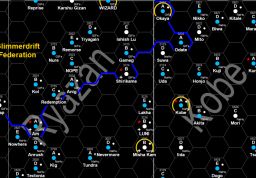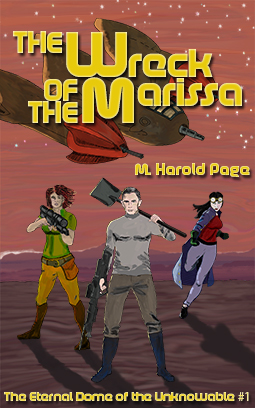Modular: The New Mongoose Traveller #2 — More Than Just a Science Fiction Midlife Crisis Simulator?

Seen from one angle, the Traveller RPG has always been a Science Fiction midlife crisis simulator, “40-somethings Innnnn Spaaaacccce.”
Seriously!
The character generation system is a mini-game that lets you play through your character’s career all the way into middle-age, a career that most of the time ends in disaster, and always ends with you mustering out to go “travelling.”
Kurtzhau (13) and I rolled up a party and ended up with:
- A scientist, feeling the bite of age, who’d made a big discovery in his youth, but had been stuck in admin ever since and now craved adventure.
- A senior NCO soldier forced by job cuts to muster out and now very much adrift in search of a purpose.
- A pilot who’d unwillingly ended up in the Scouts and spent most of his time as a courier and now belatedly wanted to do something less boring.
- A veteran of the Merchant Marine who really wanted to be a Free Trader.
You could put them all in a shared apartment and make a quirky sitcom about them. (We put them in a ship and sent them to our Dacre Sector.)

From another angle, Traveller RPG is its mini games, roughly (in order of presentation): character generation; ground combat; space operations; trade; space combat; and sector creation (for the referee).
Of these, character generation and trade feel a bit like modern board games, the former perhaps not unlike Elder Sign, and the latter not unlike trading boardgames. The net effect is a wider, more sweeping perspective, as if you were playing a map-based board game, say Eldritch Horror, but then diving down to roleplay the actual missions.
Sector generation, meanwhile, is a pleasing solitaire game in its own right. Despite there being plenty of online sector generators, we had a blast doing it with paper, pencil and dice. Just for example, the first world we created turned out to be an asteroid colony with no tech base, a low population, two factions and no formal government. The quirk turned out to be an obsession with art, and so was born Clifford’s Bane, a third-generation artist’s colony in an abandoned ancient alien base…
However, you can only really get a sense of what the game is about if you look at the totality of the rules…
Three themes seem embedded in the core Mongoose Traveller rules:
Time and Distance

In Traveller, distance is time, and time is tragically scarce.
Your character actually ages both during character generation and play!
Increasingly difficult ageing checks — with the dire possibility of lowered statistics — apply every four years from age 34. Yes, there are anti-ageing drugs of varying availability and legality, but these are addictive, providing both motivation to the player character and also premises and macguffins around which the referee can plan adventures.
Interstellar travel takes a week per “jump.” Go browse the massive Traveller Map site to get a sense of the implications. In-system travel can take days or weeks. Missions — at least ones in the style of the old 76 Patrons — can involve weeks or months of stakeouts or guard duty. And of course free trading involves wombling around a subsector for weeks or months on end. You can use the time wisely by tuning up your skills or learning new ones. However, and those ageing tests won’t get any further away….

The mortgage payments on your spaceship — if you have one — won’t get any further away either. The distances you travel in order to turn a profit — whether through trade, crime or mercenary tickets — translates into time; a week here, a month there.
And time is scarce.
Kit and Cash
In Traveller, you are only as good as your gear.
Traveller — notoriously — has no progress system. As noted, you can use character downtime — e.g. during those one-week long jumps — to try to learn extra skills. However, there’s no leveling up. The best way to increase your capability is to get better gear.
Gear isn’t tied directly to money. Even if your character begins travelling with a very full bank account, there’s a harsh cap on pre-play spending, so what you can buy depends on where you are. The local Tech Level may mean that what you need simply isn’t available or — especially in the case of weapons — the local Law Level may make its purchase illegal.
For this reason, high-end equipment, once you have it, is almost a character in its own right, to be nurtured and kept going. It’s also the only real connection between experience and increased capability: your 5th-level D&D Fighter may get a base +5 attack bonus… my experienced Traveller adventurer has a gauss rifle that does 4D6 damage and can fire on full auto.
Meanwhile, if you have a space ship, you have a mortgage on it and those crippling monthly payments are going to drive a lot of play. Some of that play will involve trading up and down the star lanes, handling vast sums of money.
Hard Randomness in an Imperfect Future

Traveller has “hard randomness” in its DNA. There are no Fate or Hero Points, no character shield, no one rule for the PCs one for the NPCs. The combat is lethal. The trade and ship maintenance rules are unforgiving.
You can easily get yourself killed in a local turf war you hired on for because you were marooned on a backwater world because you ran out of Credits.

The older versions of Traveller even had the expectation that adventures themselves would be randomly generated. Sometimes things would turn out as they seemed (the patron really is being tailed by local thugs), or the threat might be non-existent (he’s deluded), or much worse than advertised (he’s actually a gang boss being pursued by religious fanatics). Players could never bank on the rules of narrative or the logic of story providing a satisfactory conclusion thus saving them from a fool’s errand or a Bambi-versus-Godzilla moment, so they had to take all the possibilities seriously.
That hard randomness generates imperfect Travellers (the PCs) — aging screw-ups! — and sets them loose in an imperfect future where technology and civilization are unevenly spread across the stars.
Just as in our world, so in the Traveller universe. Archaic political structures like kingdoms rub shoulders with modern ones. Fighters brandish hi-tech firearms from the back of old-style beasts of burden. Tatooine would fit right into a Traveller subsector map, a map that Han Solo and Chewy would be very comfortable trading their way across.

Time and distance, kit and cash, hard randomness in an imperfect future… these are all facets of a gloriously unforgiving simulation of a recognizable but nameless subgenre of SF that relates to Space Opera the way Sword and Sorcery relates to High Fantasy.
However, ultimately, the Traveller role playing game can’t be about simulation because there’s no built-in way to “win”. Your player character can go from rags to riches and back to rags again, and that’s still fine and possibly fun.
All that randomness generates narratives that surprise with their unpredictable twists and turns. These are all the more compelling because of the grudging nature of the gaming universe. Being inconsistently rewarding, Traveller is addictive in the same way that gambling is. Both players and high rollers yearn to beat the system. However, for the player, the stake is precious gaming time, and the prize, the possibility of looking back with pride and wry amusement.
So it is that Traveller, that epitome of simulationist role playing games, is beyond anything else, about generating stories we care about because it feels as if we’ve lived them.
In common with a lot of geeks my age — 40-somethings in imaginary spaaaace — early experience of the game left me with a Traveller-shaped hole it my imagination. It’s what led me to work my way through the Dumarest books, to play Diaspora, to gather up my courage and write my own Space Opera (or is it “Space Punk”?), and then, finally, come back to the game itself in its latest incarnation.
M Harold Page is the Scottish author of The Wreck of the Marissa (Book 1 of the Eternal Dome of the Unknowable Series), an old-school space adventure yarn about a retired mercenary-turned-archaeologist dealing with “local difficulties” as he pursues his quest across the galaxy. His other titles include Swords vs Tanks (Charles Stross: “Holy ****!”) and Storyteller Tools: Outline from vision to finished novel without losing the magic. (Ken MacLeod: “…very useful in getting from ideas etc to plot and story.” Hannu Rajaniemi: “…find myself to coming back to [this] book in the early stages.”)
Thanks for featuring a hint of my map site. (link is broken though – looks like you forgot the https:// at the start)
Fixed!
And for those who’ve just tuned in: https://travellermap.com/
Just bought Storyteller Tools. Looking forward to reading it.
Thanks! Hope you find it helpful!